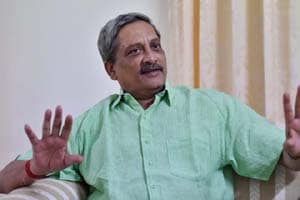The $8.8-billion Rafale deal has not yet been finalised, but is at an ‘advanced stage’, defence minister Manohar Parrikar said on Thursday, adding that “the intention was to close it quite soon”.
The BJP had on Wednesday tweeted a graphic, saying that the Rafale combat aircraft deal has been “finalised” and the Narendra Modi government had saved over `21,000 crore in the “re-negotiation” with the French government.
Last week, amid similar confusion, sources in the defence ministry had said the deal was at an advanced stage and both India and France had narrowed down their differences over the pricing issue. Responding to media queries, Parrikar said, “I can only tell you this much that while the deal is in quite an advanced stage—and we intend to close it quite soon—I still can’t say that negotiations are totally cleared until we sign the deal or at least the deal is forwarded to the Cabinet for approval.”
While there are reports floating around that the deal is expected to be closed by May-end, those who are following the negotiations and are part of the process point out that the negotiations are far from over.
“The French company Dassault is in a better space and is not really interested in hard-bargaining as its order books are full for the next few years. It is the Indian side which has been hard-bargaining as it wants the combat planes to be fully loaded. India has been bargaining for a price that is less than 8 billion Euro (`59,000 crore),” a source pointed out.
The cost of the 36 Rafales, as per the earlier tender while keeping the cost escalation into account, comes to around `65,000 crore. However, despite hard-bargaining with the French company Dassault Aviation for the 36 Rafale aircraft, a very simple cash & carry deal is far from being settled. “Besides, the ongoing price negotiations are far from over and differences over the major issue of offsets is yet to settled,” a highly placed source told FE on conditions of anonymity.
Since the Indian government is planning to buy 36 aircraft from France through a government-to-government deal, the French are not willing to accept New Delhi’s demand for enforceable guarantees, availability and delivery of the combat machines.
Though there have been reports in a section of the media that the issues related to the offsets has been resolved, sources confirmed to FE that “the offsets issues are far from being resolved. The discussions are going on and both sides are trying to reach a decision that would be mutually acceptable”.
An offer of a French defence company Thales to discharge a ‘substantial’ portion of the mandatory 50% offset requirement of the overall Rafale contract price, by helping India develop three ‘smart cities’ was rejected by the MoD. The DPP-2013 stipulates that offsets can be defrayed only in the military, civil aviation, internal security and related service sectors, and it contains no provision for discharging ancillary offsets.
According to Rahul Bedi of Jane’s Defence Weekly, UK, “Thales provides equipment and systems — including avionics — that account for around a third of each Rafale’s total value. In response to Thales’ offer, the MoD maintained that such an indirect offset provision was not part of the Defence Procurement Procedure (DPP)-2013, under which the twin-engine Rafales were being acquired via an inter-governmental agreement (IGA).”


